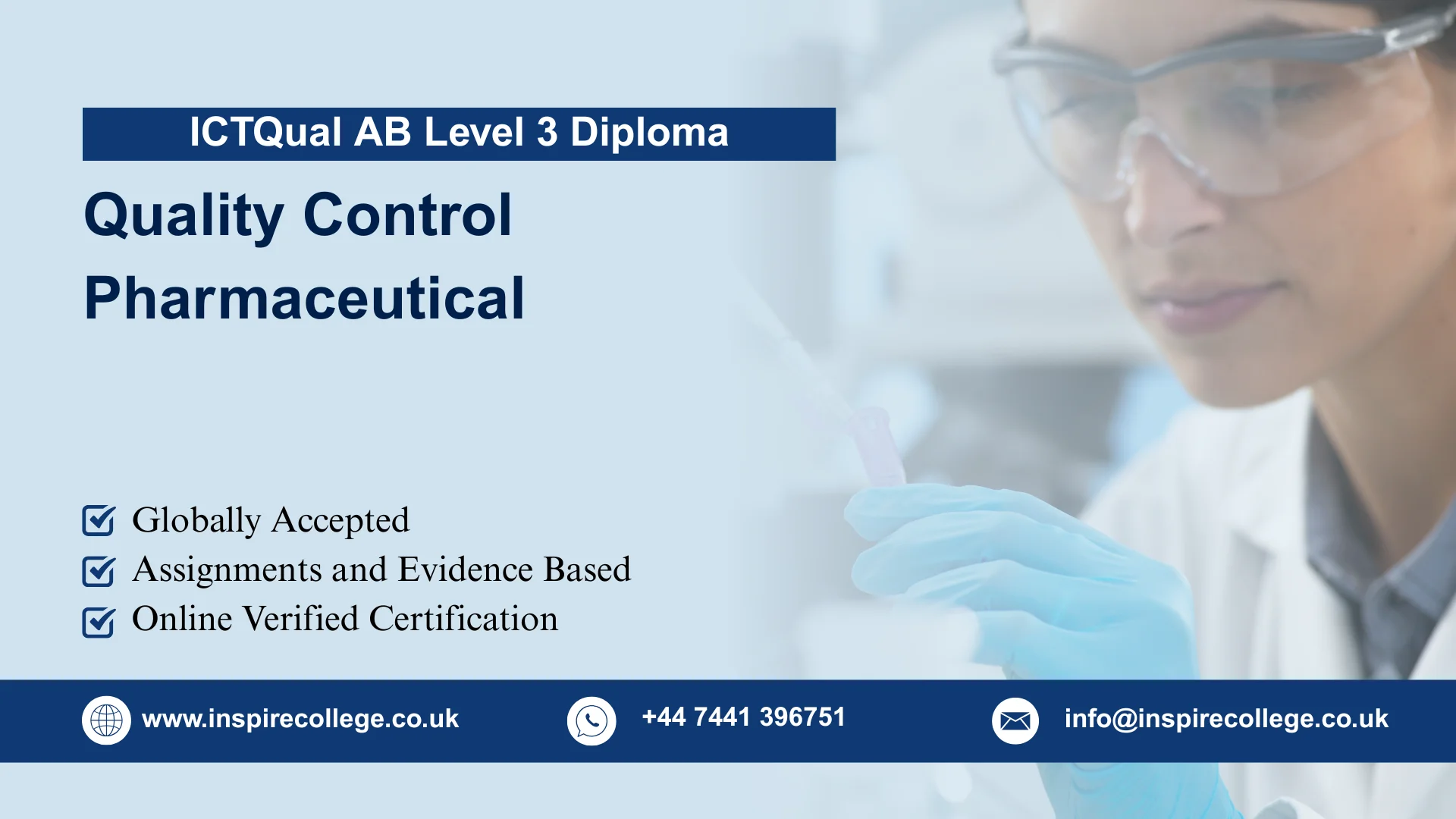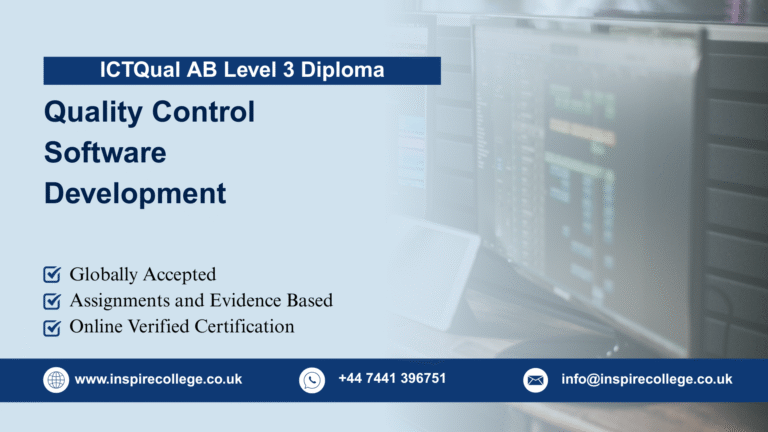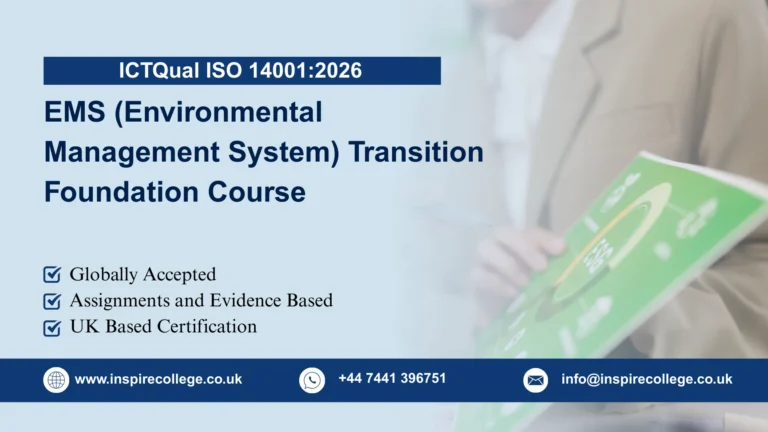
ICTQual AB Level 3 Diploma in Quality Control Pharmaceutical
The pharmaceutical industry requires highly skilled professionals who can ensure the safety, quality, and compliance of medicinal products. The ICTQual AB Level 3 Diploma in Quality Control Pharmaceutical is a career-focused qualification designed to meet the demands of this fast-growing global sector. It provides a robust foundation for individuals aspiring to work in pharmaceutical production, quality assurance, or laboratory settings.
This diploma equips learners with the technical knowledge and practical skills needed to maintain quality standards in pharmaceutical manufacturing and testing environments. Whether you are starting your career or seeking to strengthen your credentials, this qualification offers a recognised and respected route into the industry.
The ICTQual AB Level 3 Diploma in Quality Control Pharmaceutical is tailored for individuals who want to specialise in quality assurance within pharmaceutical environments. It combines theoretical understanding with hands-on learning, focusing on the essential principles of good manufacturing practices, laboratory procedures, quality documentation, and compliance protocols.
The ICTQual AB Level 3 Diploma in Quality Control Pharmaceutical is ideal for those who wish to start or develop a career in a highly regulated and impactful industry. The pharmaceutical sector continues to grow globally, with increasing demand for skilled professionals in quality control, assurance, and compliance roles.
To enrol in the ICTQual AB Level 3 Diploma in Quality Control Pharmaceutical, learners must meet the following entry criteria to ensure they are prepared for the academic and technical demands of the course:
Academic Requirements
- A minimum Level 2 qualification (such as GCSEs or equivalent), preferably in a science-related subject like chemistry, biology, or applied science
- Basic understanding of scientific principles relevant to pharmaceutical operations
Language Proficiency
- Proficiency in English (both written and spoken) is essential for understanding course materials and completing assessments effectively
Personal Attributes
- Interest in pharmaceutical manufacturing, laboratory work, or quality assurance
- Attention to detail and a methodical approach to learning and problem-solving
- Motivation to work in a regulated, science-driven environment
Mature Learners and Industry Experience
- Applicants without formal qualifications may be accepted based on relevant work experience in pharmaceutical, healthcare, laboratory, or manufacturing settings
- Recognition of prior learning and professional competencies may also be considered during the application process
International Learners
- Equivalent international qualifications will be accepted
- Proof of English language ability may be required for non-native speakers
These entry requirements help ensure learners are well-suited to succeed in the programme and prepared for future opportunities in the pharmaceutical industry.
Mandatory Units
This qualification, the ICTQual AB Level 3 Diploma in Quality Control Pharmaceutical, consists of 6 mandatory units.
Mandatory Units
- Fundamentals of Pharmaceutical Quality Control
- Introduction to Good Manufacturing Practices (GMP)
- Pharmaceutical Sampling and Analytical Techniques
- Documentation and Record-Keeping in Pharmaceutical Quality
- Deviation, Non-Conformance, and CAPA Management
- Internal Audits and Compliance Monitoring
Learning Outcomes for the Study Units:
1. Fundamentals of Pharmaceutical Quality Control – Learning Outcomes
By the end of this unit, learners will be able to:
- Understand the principles and objectives of pharmaceutical quality control
- Identify the key components of a pharmaceutical quality system
- Explain the importance of quality control in ensuring product safety and efficacy
- Distinguish between quality control and quality assurance functions
- Recognize the role of QC in regulatory compliance and risk mitigation
2. Introduction to Good Manufacturing Practices (GMP) – Learning Outcomes
By the end of this unit, learners will be able to:
- Define Good Manufacturing Practices and their significance in the pharmaceutical industry
- Interpret key GMP guidelines and regulatory requirements
- Apply basic GMP principles to daily operations in pharmaceutical settings
- Understand the responsibilities of personnel under GMP regulations
- Identify and implement GMP procedures in production and quality environments
3. Pharmaceutical Sampling and Analytical Techniques – Learning Outcomes
By the end of this unit, learners will be able to:
- Explain the purpose and importance of sampling in pharmaceutical quality control
- Identify appropriate sampling methods for raw materials, in-process, and finished products
- Conduct accurate sampling in compliance with standard operating procedures (SOPs)
- Apply basic analytical techniques for pharmaceutical testing
- Record and report test results with accuracy and integrity
4. Documentation and Record-Keeping in Pharmaceutical Quality – Learning Outcomes
By the end of this unit, learners will be able to:
- Understand the importance of documentation in a regulated pharmaceutical environment
- Maintain accurate and compliant records for quality-related activities
- Follow Good Documentation Practices (GDP) in creating and reviewing records
- Identify different types of documents used in QC and GMP systems
- Ensure traceability and accountability through proper documentation procedures
5. Deviation, Non-Conformance, and CAPA Management – Learning Outcomes
By the end of this unit, learners will be able to:
- Define deviations and non-conformances within the quality control process
- Understand the root cause analysis process and its application in quality systems
- Implement Corrective and Preventive Actions (CAPA) to address quality issues
- Document deviations and CAPA actions in compliance with regulatory standards
- Monitor the effectiveness of CAPA and continuous improvement initiatives
6. Internal Audits and Compliance Monitoring – Learning Outcomes
By the end of this unit, learners will be able to:
- Understand the purpose and process of internal audits in pharmaceutical quality systems
- Participate in audit planning, execution, and follow-up activities
- Identify non-compliance issues and suggest appropriate corrective measures
- Evaluate organizational compliance with GMP and standard operating procedures
- Contribute to audit readiness and regulatory inspection preparedness
The ICTQual AB Level 3 Diploma in Quality Control Pharmaceutical is designed for individuals who aspire to build a career in the pharmaceutical industry, particularly in areas related to quality assurance, laboratory operations, and manufacturing compliance. This course is suitable for a wide range of learners at different stages of their professional journey.
- School leavers and college graduates with a background or interest in science, looking to enter the pharmaceutical or life sciences sector
- New entrants to the pharmaceutical industry seeking a structured and recognised qualification in quality control
- Laboratory assistants and production operatives aiming to advance into quality-focused roles
- Employees in pharmaceutical manufacturing or packaging who wish to formalise their experience and enhance their skills
- Quality control personnel who want to gain additional qualifications to support career progression
- Professionals from related industries (such as food production, biotechnology, or cosmetics) who are transitioning into pharmaceutical quality roles
- International learners who require a UK-standard diploma to support employment or further study in regulated environments
- Mature learners with practical experience but without formal qualifications, seeking career development in pharmaceutical quality control
This diploma is designed to accommodate both aspiring professionals and current employees who are committed to developing their technical knowledge and meeting industry standards in a globally important sector.
Register Now
FAQs for ICTQual AB Level 3 Diploma in Quality Control Pharmaceutical






